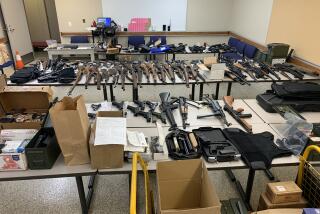Court Rejects Nuclear Plant Protest Appeal
- Share via
SAN FRANCISCO — A legal defense under which protesters arrested at nuclear weapons’ plants have argued that their actions were needed to reduce the risk of atomic warfare has been struck down by a state appeal court.
In the first known ruling on the issue by a California appellate court, the 1st District Court of Appeal on Friday rejected the so-called necessity defense, which is being offered with increasing frequency by demonstrators arrested at political protests.
At issue is whether the defendants would be allowed to tell the jury that they felt they had no choice but to break a state law in order to follow some higher law, or international law.
The appeal court rejected that defense for David Weller and Robert Goldsborough. They were among the demonstrators arrested for trespassing in 1979 as they handed out leaflets to employees at a Lockheed Missiles and Space Corp. plant in Sunnyvale, Calif., where the Trident II missile was being developed.
Must Bear Consequences
“Unless the laws are held unconstitutional, those challenging or defying them must be prepared to bear the short-term consequences of their actions in the hope that society will benefit and that historians will look charitably upon them,” said Presiding Justice Clinton White.
Weller and Goldsborough wanted to tell the jury that they considered the Trident II a first-strike weapon and believed that trespassing was the only way they could reduce the threat of nuclear war. They were prepared to offer testimony by a designer of the missile, who would have contended it had a destabilizing effect on the arms race, and they also wanted to argue that its development violated international law.
A Santa Clara County Municipal Court judge barred the proposed testimony, and a jury then convicted the men of trespassing. They were sentenced to 45 days in jail, or a $150 fine and community service.
More to Read
Sign up for Essential California
The most important California stories and recommendations in your inbox every morning.
You may occasionally receive promotional content from the Los Angeles Times.













